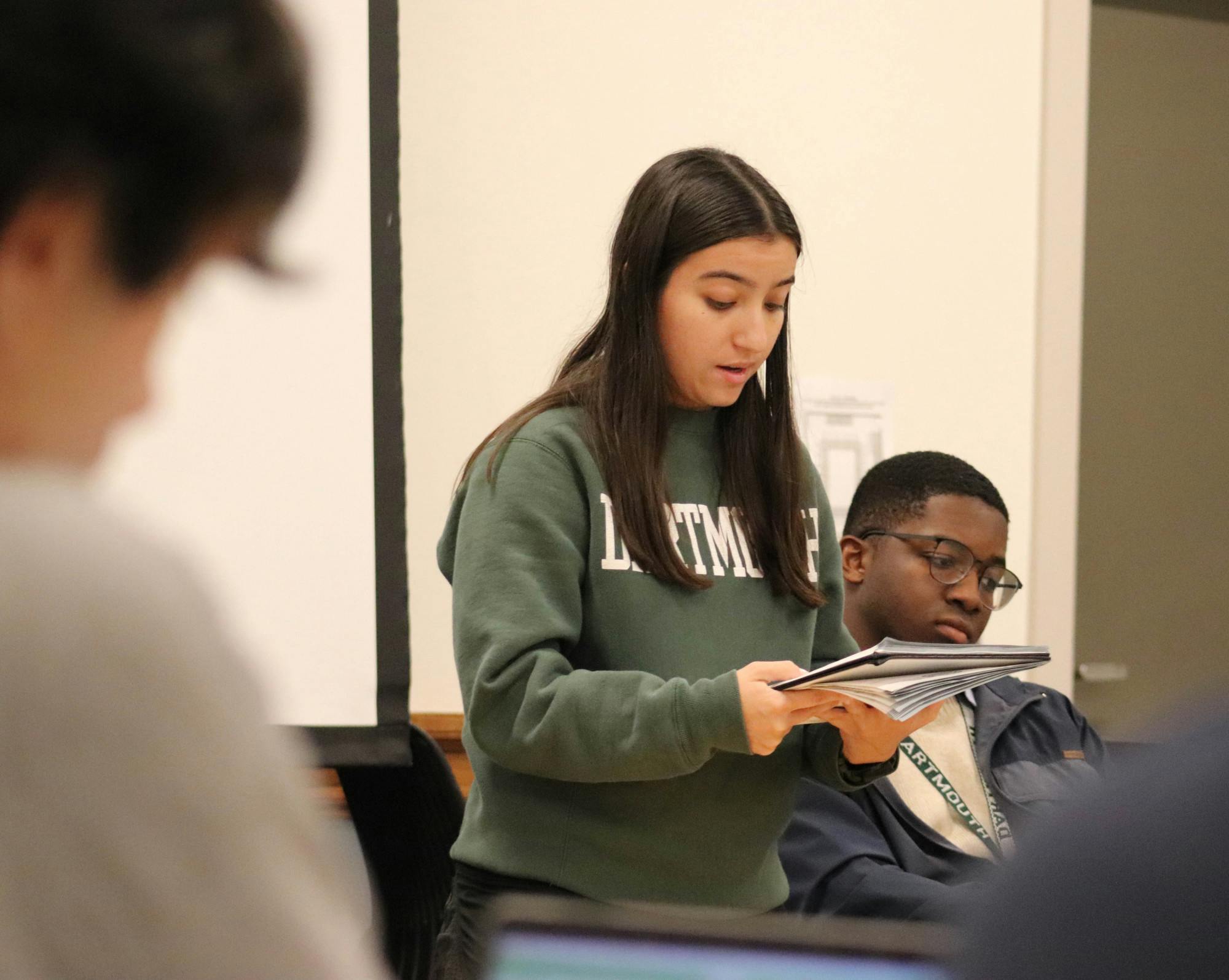On Oct. 22, the Dartmouth Student Government Senate met for its sixth weekly meeting of the term. Led by student body president Jessica Chiriboga ’24, the Senate discussed campus responses to the Israel-Hamas war and goals to further cultivate community in residential dorms.
During the meeting, Chiriboga summarized her meeting with College President Sian Leah Beilock, during which they discussed student responses and concerns about the Israel-Gaza War.
“Students on all sides feel really scared, angry and confused,” Chiriboga said. “[We’re] making sure staff members are providing support that’s sensitive to students and the difficult feelings and events happening in their own lives.”
According to Chiriboga, Beilock convened an internal group consisting of “senior leaders and non-senior leaders” to support students impacted by the war. She added Beilock organized an administrative subgroup on doxxing to meet daily, in an effort to raise awareness about student resources for any students who have been doxxed or otherwise threatened.
At Harvard University, students affiliated with one of the 30 student groups that co-signed an open letter denouncing Israel on Oct. 7 — the night of Hamas’s attack on Israel — have had their personal information posted online, family members threatened and faces shown on billboard trucks in Harvard Square, according to the New York Times.
“This is definitely not just an issue of student safety and security, but also student wellness,” Chiriboga said.
In her meeting with other DSG members prior to the Senate meeting, Beilock shared that the College provided free security at the Oct. 12 vigil co-hosted by Hillel and Chabad, as well as the Oct. 19 memorial service co-hosted by the Palestine Solidarity Coalition and Al-Nur.
However, some students reported feeling unprotected and at odds with College administration. Members of the campus Sunrise Movement chapter, one of the 13 student groups that cosigned the PSC’s statement on the war in Gaza, have staged an ongoing protest outside of Parkhurst Hall since the Oct. 19 memorial, according to their Instagram page.
In addition, Dartmouth Sunrise claims that they faced “harassment and college suppression” as a result of their presence in front of Parkhurst.
“The institution has consistently denied providing students with a space to mourn the loss of Palestinian lives, so our community came together to create one,” according to the post.
They also alleged that Department of Safety and Security officers have “repeatedly” tried to remove the black flags.
Kevin Engel ’27, a member of Dartmouth Sunrise who participated in the protest for 72 hours, spoke during an Oct. 25 walkout to “defend the Parkhurst vigil,” as one flyer demanded. They explained that DoSS officers “took my food, took my water” and “claimed that they would take our belongings and claim it as abandoned property.”
“They bring policy after policy, which is intentionally ambiguous and vague,” they said. “They’ve admitted on camera that we are doing nothing wrong. There’s no policy against sitting [on the Parkhurst steps], standing here.”
According to Chiriboga, the College has been doing “a lot better than other universities” in terms of easing campus tensions, attributing this to Dartmouth’s relatively small student body and a “changing attitude” about “safe spaces” on campus.
She added that Beilock had suggested hosting smaller, faculty-led forums for students to converse about the violence and the war, which would be “in line” with Beilock’s “vision” for safe spaces.
According to Chiriboga, she and chief of staff Anthony Fosu ’24 also recently met with officials from Residential Operations and the Office of Residential Life to discuss cultivating a “community of care” on campus.
Chiriboga added that the Office of Residential Life was both “willing and excited” to incorporate custodians more into the student experience in dorms.
“Introducing the custodians to first year students during the first UGA meeting can humanize the staff members who are picking up after people in the buildings,” Chiriboga said.
During the Senate meeting on Sunday, DSG officials stated that several other topics of discussion were “off the record.” DSG Senate meetings occur weekly on Sundays at 7 p.m. in Collis 101 and are open to all students.
Correction Appended (Oct. 26, 12:55 p.m.): A previous version of this article stated the incorrect date that the Senate meeting was held. It also incorrectly stated that Chiriboga was interviewed after the Senate meeting. Chiriboga’s quotes were taken from the meeting. The article has been updated.




